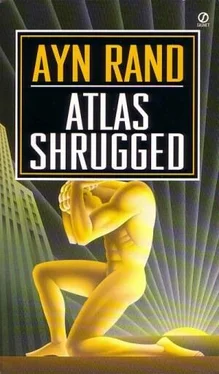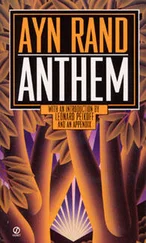On the palm of her hand, she was extending her diamond bracelet to Lillian.
"You're not serious, Miss Taggart?" said a woman's voice.
It was not Lillian's voice. Lillian's eyes were looking straight at her.
She saw them. Lillian knew that she was serious.
"Give me that bracelet," said Dagny, lifting her palm higher, the diamond band glittering across it.
"This is horrible!" cried some woman. It was strange that the cry stood out so sharply. Then Dagny realized that there were people standing around them and that they all stood in silence. She was hearing sounds now, even the music; it was Halley's mangled Concerto, somewhere far away.
She saw Rearden's face. It looked as if something within him were mangled, like the music; she did not know by what. He was watching them.
Lillian's mouth moved into an upturned crescent. It resembled a smile. She snapped the metal bracelet open, dropped it on Dagny's palm and took the diamond band.
"Thank you, Miss Taggart," she said.
Dagny's fingers closed about the metal. She felt that; she felt nothing else.
Lillian turned, because Rearden had approached her. He took the diamond bracelet from her hand. He clasped it on her wrist, raised her hand to his lips and kissed it.
He did not look at Dagny.
Lillian laughed, gaily, easily, attractively, bringing the room back to its normal mood.
"You may have it back, Miss Taggart, when you change your mind," she said.
Dagny had turned away. She felt calm and free. The pressure was gone. The need to get out had vanished.
She clasped the metal bracelet on her wrist. She liked the feel of its weight against her skin. Inexplicably, she felt a touch of feminine vanity, the kind she had never experienced before: the desire to be seen wearing this particular ornament.
From a distance, she heard snatches of indignant voices: "The most offensive gesture I've ever seen. . . . It was vicious. . . . I'm glad Lillian took her up on it. . . . Serves her right, if she feels like throwing a few thousand dollars away. . . . "
For the rest of the evening, Rearden remained by the side of his wife.
He shared her conversations, he laughed with her friends, he was suddenly the devoted, attentive, admiring husband.
He was crossing the room, carrying a tray with drinks requested by someone in Lillian's group—an unbecoming act of informality which nobody had ever seen him perform—when Dagny approached him.
She stopped and looked up at him, as if they were alone in his office.
She stood like an executive, her head lifted. He looked down at her. In the line of his glance, from the fingertips of her one hand to her face, her body was naked but for his metal bracelet.
"I'm sorry, Hank," she said, "but I had to do it."
His eyes remained expressionless. Yet she was suddenly certain that she knew what he felt: he wanted to slap her face.
"It was not necessary," he answered coldly, and walked on.
It was very late when Rearden entered his wife's bedroom. She was still awake. A lamp burned on her bedside table.
She lay in bed, propped up on pillows of pale green linen. Her bed jacket was pale green satin, worn with the untouched perfection of a window model; its lustrous folds looked as if the crinkle of tissue paper still lingered among them. The light, shaded to a tone of apple blossoms, fell on a table that held a book, a glass of fruit juice, and toilet accessories of silver glittering like instruments in a surgeon's case. Her arms had a tinge of porcelain. There was a touch of pale pink lipstick on her mouth. She showed no sign of exhaustion after the party—no sign of life to be exhausted. The place was a decorator's display of a lady groomed for sleep, not to be disturbed.
He still wore his dress clothes; his tie was loose, and a strand of hair hung over his face. She glanced at him without astonishment, as if she knew what the last hour in his room had done to him.
He looked at her silently. He had not entered her room for a long time. He stood, wishing he had not entered it now.
"Isn't it customary to talk, Henry?"
"If you wish."
"I wish you'd send one of your brilliant experts from the mills to take a look at our furnace. Do you know that it went out during the party and Simons had a terrible time getting it started again? . . . Mrs.
Weston says that our best achievement is our cook—she loved the hors d'oeuvres. . . . Balph Eubank said a very funny thing about you, he said you're a crusader with a factory's chimney smoke for a plume. . . .
I'm glad you don't like Francisco d'Anconia. I can't stand him."
He did not care to explain his presence, or to disguise defeat, or to admit it by leaving. Suddenly, it did not matter to him what she guessed or felt. He walked to the window and stood, looking out.
Why had she married him?—he thought. It was a question he had not asked himself on their wedding day, eight years ago. Since then, in tortured loneliness, he had asked it many times. He had found no answer.
It was not for position, he thought, or for money. She came from an old family that had both. Her family's name was not among the most distinguished and their fortune was modest, but both were sufficient to let her be included in the top circles of New York's society, where he had met her. Nine years ago, he had appeared in New York like an explosion, in the glare of the success of Rearden Steel, a success that had been thought impossible by the city's experts. It was his indifference that made him spectacular. He did not know that he was expected to attempt to buy his way into society and that they anticipated the pleasure of rejecting him. He had no time to notice their disappointment.
He attended, reluctantly, a few social occasions to which he was invited by men who sought his favor. He did not know, but they knew, that his courteous politeness was condescension toward the people who had expected to snub him, the people who had said that the age of achievement was past.
It was Lillian's austerity that attracted him—the conflict between her austerity and her behavior. He had never liked anyone or expected to be liked. He found himself held by the spectacle of a woman who was obviously pursuing him but with obvious reluctance, as if against her own will, as if fighting a desire she resented. It was she who planned that they should meet, then faced him coldly, as if not caring that he knew it. She spoke little; she had an air of mystery that seemed to tell him he would never break through her proud detachment, and an air of amusement, mocking her own desire and his.
He had not known many women. He had moved toward his goal, sweeping aside everything that did not pertain to it in the world and in himself. His dedication to his work was like one of the fires he dealt with, a fire that burned every lesser element, every impurity out of the white stream of a single metal. He was incapable of halfway concerns.
But there were times when he felt a sudden access of desire, so violent that it could not be given to a casual encounter. He had surrendered to it, on a few rare occasions through the years, with women he had thought he liked. He had been left feeling an angry emptiness—because he had sought an act of triumph, though he had not known of what nature, but the response he received was only a woman's acceptance of a casual pleasure, and he knew too clearly that what he had won had no meaning. He was left, not with a sense of attainment, but with a sense of his own degradation. He grew to hate his desire. He fought it. He came to believe the doctrine that this desire was wholly physical, a desire, not of consciousness, but of matter, and he rebelled against the thought that his flesh could be free to choose and that its choice was impervious to the will of his mind. He had spent his life in mines and mills, shaping matter to his wishes by the power of his brain—and he found it intolerable that he should be unable to control the matter of his own body. He fought it. He had won his every battle against inanimate nature; but this was a battle he lost.
Читать дальше










